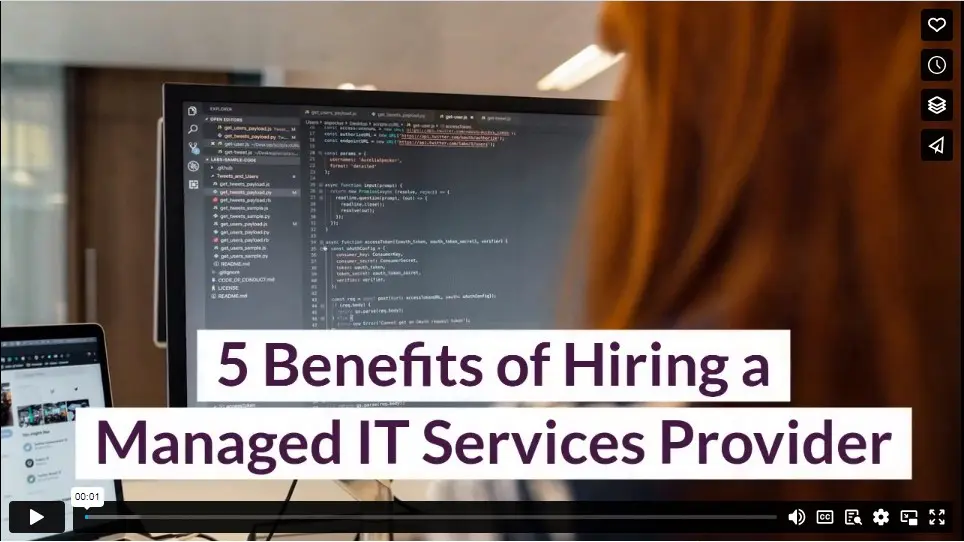Businesses in every industry place emphasis on IT efficiency, but not all companies are equally equipped to streamline their information technology operations. Enter managed IT services, a cost-effective solution where external IT experts manage a company’s information technology infrastructure and end-user systems.
Despite having been around for quite some time, managed IT services providers have become beneficial for enterprises only recently. Today, you can hire an MSP to handle your entire IT infrastructure (known as full-blown outsourcing) or run a single function you’d prefer not to manage in-house, referred to as out-tasking. For instance, you could out-task network management to an MSP.

(Israel Andrade / unsplash)
Types of managed IT services:
- Managed cloud services: private and public cloud management
- End-user computing: IT procurement and platform management for digital workspaces
- Security management: network security and anti-malware solutions
- Communication services: managing and monitoring communication data and apps
- Data analytics: helping clients identify and analyze KPIs
- Application support: keeping business-critical apps secure and updated
- IT support: spans all IT-related assistance from addressing small issues to advanced challenges
The IT managed services market continues to grow as more companies rely on well-managed IT infrastructure to keep their operations running. Recent advances in cloud computing have further accelerated the growth of the MSP industry. ResearchAndMarkets predicts the MSP market will be worth $311.32 billion by 2027, growing at a CAGR of 12.44 percent between 2022 and 2027.
So what are the key benefits of hiring a managed IT services provider?
1. Gain Access to Experts
Your in-house team may only detect general problems affecting your IT systems. In contrast, MSP experts can identify a wide range of IT issues, from basic errors to advanced vulnerabilities. So when a new problem arises, MSPs can solve it for you quickly since they detected it beforehand.
MSPs also regularly train their personnel, keeping them updated with the latest technologies. Companies benefit from this updated knowledge without needing to pay for training as they would have for an in-house employee.
2. Prevent Downtime
A reliable managed services provider will take a proactive approach toward managing your critical systems. They’ll deploy a 24/7 monitoring team and address vulnerabilities before they become a problem. If an issue is found, great MSPs will perform RCA (root cause analysis) to prevent the same problem from affecting your operations.
Using an MSP can help you minimize downtime and maximize uptime. Considering that IT downtime can cost companies up to $5,600 per minute, partnering with an MSP is really a no-brainer.
3. Scale Your Networks
Company owners know scaling networks requires significant manpower, equipment, and coordination. It’s a huge task for any business and requires the complete focus of in-house employees. Fortunately, managed IT services can help you upgrade or expand your systems without requiring you to tie up your resources.
MSPs also help your company stay flexible by accommodating changes your in-house team might not be able to respond to effectively. Rather than rushing to send in-house employees to training when your company network requires an upgrade, it’s smarter to take a proactive approach by working with a managed IT services provider.
4. Improve Vendor Management
Vendor coordination can be complex, and staff members without significant experience dealing with different vendors can easily get overwhelmed. A managed IT services provider can interface with vendors on your behalf, escalating problems to the appropriate party and tracking resolutions through to implementation.
Vendors also prefer having a single, trusted partner rather than dealing with multiple people to deploy their solutions. An MSP will act as a coordinator for your company and third parties, ensuring software is deployed effectively and employees aren’t burdened with a task that’s best handled by field-level experts.
5. Enhance IT Security
When it comes to IT systems, companies are exposed to new threats each day. Unless they are taking measures to mitigate these risks, they can experience both financial and reputational damage. One way to decrease network security risk is to use an MSP that can remotely prevent threats from damaging your systems.
A managed IT services provider will take steps to prevent hackers from accessing confidential information or misusing network privileges. Leading MSPs also have experts to detect and prevent malware, identify and resolve configuration issues, and patch vulnerabilities to reduce risk. Regarding the tech stack, you can expect MSPs to use Intrusion Prevention Systems (IPSs), 24/7 network monitoring, and other information security solutions.
At Summit Technology, we strive to break the mold of the standard VARs and MSPs and forge a unique technology consultancy. By combining out-of-the-box thinking with IT expertise and creativity, we can assist you in choosing the right technologies and also help you operate, integrate, and innovate on those platforms to drive the most value possible. Contact us to reap the benefits of managed IT services and increase efficiency for your organization.
Video




